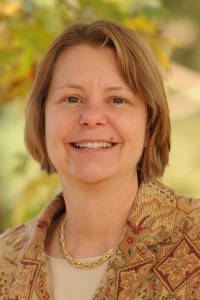Thursday was Usability Day around the world, and this was the fifth year Michigan Tech was involved. The event celebrates usability, when technologies or procedures make sense to us and when we can learn–and remember–how to use them, make few errors and feel satisfied with our experiences.
We caught up with a couple of projects taking place at Tech.
The Human Interface Design Enterprise was showing off their driver simulator in Rekhi Hall.
It was one of a couple of major projects the group has taken on, according to Margo Woller-Carter, a PhD student in applied cognitive science and human factors.
“We are using a Uconnect system from Chrysler to test for driver distraction,” she said. “We designed this driver simulator to use with it, and we will also be doing some eye-tracking for them.” Uconnect was a multimedia system on steroids: entertainment, phone, navigation, voice command, controls, and wifi: perfect for testing for distractions. The Enterprise was in the second year of a three-year contract with Chrysler.
And on this day, there was plenty of distraction going on: radio playing, Uconnect with lots of buttons to play with, a road ahead on the computer screen, and many people walking in and out of the room. Students took turns behind the wheel of the 60 mph simulation. Some did a little off-roading and even off-globing.
Woller-Carter said they also have some work with the HVAC folks at Chrysler, including a smartphone app for adjusting temperature from anywhere in the car.
One key to all their app work is to keep them user friendly. “There are so many bad apps today,” said second-year computer engineering major Andrew Timmerman. He, too, took a turn on the simulator, exploring some of the features of the Uconnect: estimated time to complete the required number of laps at 60, various gauge settings, including temperature, etc.
The eye-tracking will be an interesting undertaking, the assembled students thought. Eye-tracking is a method employed in usability studies where sensors record where humans’ eyes are focused. Currently, eye-tracking uses six sensor points on the face and it loses accuracy when you move your head. That has important ramifications when you are analyzing distractions.
The HIDE plan might include adding more sensor points to prevent data loss, Woller-Carter said.
“Or we might just come up with a whole new system,” she said.
She also said it was important for the two teams (design and evaluation) to see the whole design process, to not just design or test.
Read more in Tech Today
by Dennis Walikainen, senior editor

